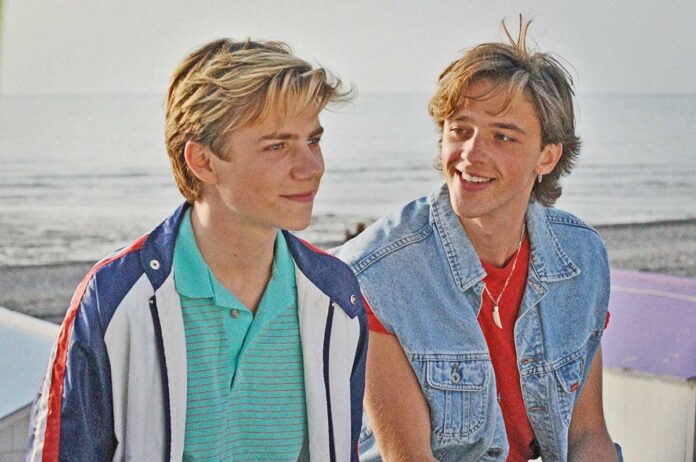Out gay filmmaker Francois Ozon’s “Summer of 85,” opening July 2, is an absorbing and sensitive teenage romance that shifts into a crime drama. Set in a seaside community in Normandy, the film opens with Alex (Félix Lefebvre), a baby-faced teen, being taken in handcuffs by the police. He narrates this story of his loss of innocence, which recounts in flashback how Alex met and fell in love with David (Benjamin Voisin) who — spoiler alert — becomes the corpse in the story.
Ozon recently chatted with PGN about making this lively tale of heartbreak and death.
What appealed to you about Aidan Chambers’ young adult novel (“Dance on My Grave”) that you adapted it for this film?
I read the book when I was 17, in 1985, and I really loved it. As a teenager, I was not used to reading this kind of gay love story without guilt. The fact that the two boys were gay was not an issue in the story. It was quite surprising because all the gay representation in the 1980s, just before AIDS, was already very dark, and difficult, and I enjoyed that this story was a beautiful, universal love story.
When you were a teen, were you more like Alex or David? Can you talk about how you identified with each character?
I identified with both of them. At that time, I was like Alex, and now, maybe, I’m like David. I’ve changed. What I liked about the story was that Alex is full of illusion, he’s dreaming of love. It’s sad to see that he realized love is not exactly what he was dreaming of. It’s complex. There is something very romantic and charming about David.
On that same idea, what can you say about the dynamics of the relationship between Alex and David? There is a seductive intensity to it.
I think there is a contrast between the maturity of the two boys. Alex is quite younger and doesn’t have experience of life. There is a real gap between the two. Alex is dreaming of a charming prince, and David thinks that doesn’t exist. There are two visions of love in the film. I show that in the scene in the nightclub, when they are dancing together but are not in the same rhythm.
The film is cleverly constructed as a coming-of-age/seduction story, and a mystery, an investigation of a crime. Can you talk about your approach to the narrative?
My first approach was to be more linear, but reading the book again, I realized I love the construction of the book, which was like a puzzle. You have to put the pieces together. I decided to be faithful to the novel. I decided to follow Alex’s point of view and that he’s confused at the start of the film. He’s done something bad, but there is a mystery construction to what he has done. It’s a way to play with the audience, which is something I like.
Can you talk about how the characters present themselves, their thoughts and their actions?
It’s a classical theme in teen movies, the “reality principle,” and I like the voiceover because you can imagine — what we see is not exactly the reality. Maybe he is dreaming? This is what David says to him: You don’t see the reality of your eyes; you are dreaming what we are living. Maybe the spectator is having the same feeling? In a love story, you are under their spell. The fact that you have to write a story is a way to reinvent it or make it better than it was. That’s the strength of art. There is something therapeutic for Alex to rewrite his story and express what he felt with David.
The film also addresses themes of class, and David’s family observes Jewish rituals. What do you think about the differences between Alex and David’s families?
They are not the same class. It was important David was Jewish because the rituals about death are different from Catholic or Protestant. He’s Jewish and gay, but neither of those things are an issue. Usually, it is a big deal, but in this case, we don’t care, and the boys don’t care.
What can you say about creating the film’s shifting tone?
I think the different tones come from the spirit of a teenager. When you are a teenager, you change your mind easily. One day you are king of the world, and the next, you want to die. The emotions are very up and down. I decided to make this film for the teenager I was; it is the film I wanted to see when I was 17. It would have been important in my development to see such a love story on the big screen at this time. For those still young at heart, they can connect with it, but it’s really a film for young people.

